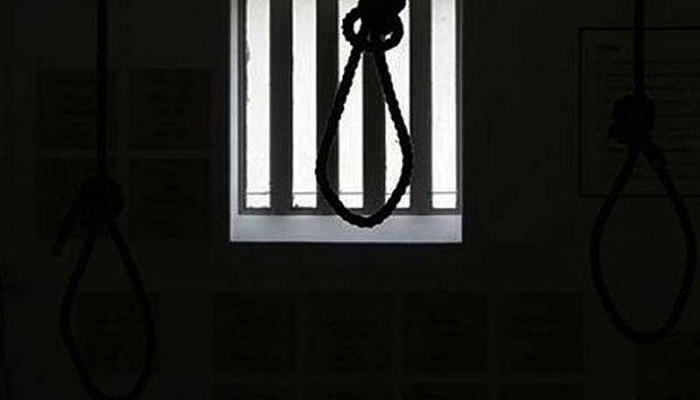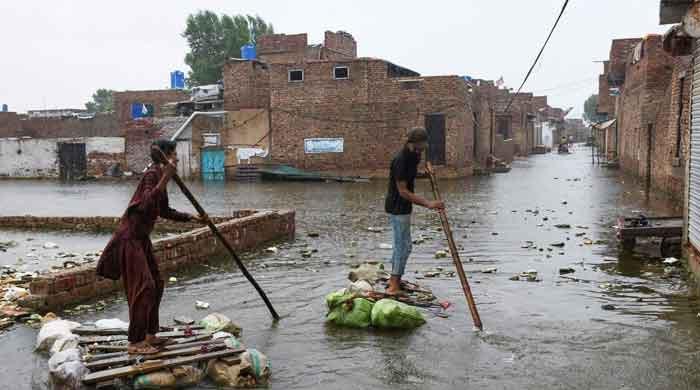Kanizan’s story: From child labour to death row
Kanizan, who suffers from schizophrenia, has been on death row for the last 32 years, here is her story
March 09, 2020

I imagine that after 32 years of being trapped behind bars the body can find comfort in exercising even the smallest acts of agency. Perhaps for Kanizan, even bending forward to mimic the silhouette of a fetal position could momentarily elicit the feeling of comfort of her mother's womb – taking her back to a time when poverty and systematic discrimination had not stripped her of her childhood, her family, her freedom.
Kanizan has lost the ability to tell me if this is how she feels. I cannot imagine that Pakistan’s death row can offer her anything else.
Kanizan’s mother died when she was very young. At the age of 14, she had to take on the role of a breadwinner for her family. In 1987, when states across the globe were establishing initiatives to address and combat child labor, young, innocent Kanizan was forced to accept work as a housemaid for a wealthy, landowning family.
Also read: Tortured into confessing: How a teenage boy ended up on death row
The five children Kanizan, a child herself, had to care for were close to her age, but she loved them dearly.
On July 27, 1989, the children and their mother were murdered. That night, Kanizan was far away from the crime scene, resting in her quarters, completely oblivious of the happenings. When she found out, she was traumatized. Not only had she lost her friends but she was also being accused of their killings.
Days went by, until one day an officer showed up at her doorstep and asked her to accompany him to a police station, to help with the probe.
The men interrogated and tortured her for 15 days. Her painful screams would echo through the neighborhood outside the police station. Kanizan maintained her innocence and till then she was confident that the justice system would be on her side.
Also read: Murals of Pakistani female activists vandalised
But she could not be more wrong. Outside the cell, a different narrative was being drafted against her. One that spun far out of her control.
According to this version of events, the maid was far older than her family knew her to be and that she was romantically involved with the husband of the murdered wife.
The men in uniform knew that the teenager was not educated enough to read legal documents or to know her rights. They knew she was from a low-income family that could not afford to access the legal protections to which she was entitled. They knew her father could not afford her bail.
Eventually they broke Kanizan and forced her to confess to a crime she did not commit.
Despite maintaining her innocence and insisting in court that the confession was void as it was extracted through torture, on January 7, 1991, Kanizan was sentenced to death.
Also read: SC stays execution of mentally-ill death-row prisoner Ghulam Abbas
Her appeals and mercy petitions were rejected. Over the next few years, Kanizan’s mental health deteriorated rapidly. In 2000, she was diagnosed with schizophrenia, and by 2006, due to the severity of her condition, she was shifted to the Punjab Institute of Mental Health.
Today, Kanizan's case is before the Supreme Court of Pakistan. The bench hearing her case has ordered a medical examination, in order to determine whether she is eligible for commutation of her sentence on medical grounds.
Still, the threat of execution looms over her. At any moment, if the case is concluded without a decision in her favor, a black warrant could be issued, scheduling the imminent death of a mentally ill woman.
One hopes and prays that Kanizan is set free, as she is not fit to be executed by domestic or international legal standards.
Also read: India court orders Nirbhaya rapists hanged on Jan 22
Too many of us have been conditioned to accept domestic child labor. These young girls and boys clean our homes, wash our clothes, cook our food. We tell ourselves that we are their saviors; that a child born into poverty only has two options, either to starve to death or work from a young age.
Children born into poverty are easier to exploit and are dependent on other stakeholders to advocate for their rights.
Pakistan must collectively demand the better implementation of policies that protect vulnerable children. If Kanizan has been afforded any of these protections, she would not have had to spend nearly her entire life in prison cells and mental hospitals.
Awan is a student of legal studies at NYU Abu Dhabi. She is interning at Justice Project Pakistan.











